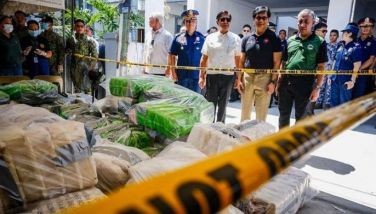Parable of the turmeric tea #28StoriesofGiving
MANILA, Philippines - It was a Friday afternoon. Some of the tea makers had gone home for the weekend; there are a handful of on-call women who stay over in a lodge near the Canossian Sisters convent in San Jose City, Nueva Ecija.
Emelita “Mel” Bulandos, 53, and three other women stayed to show how they make turmeric tea and salabat (ginger tea) in the convent’s little kitchen. They start juicing the rhizomes, whose sharp herbal aroma makes one sneeze, as if ready for a blessing.
Back home in Estrella, in the province of Rizal, some 45 minutes from the convent, Mel is a loving wife to Felicisimo and a doting mother of six. Paulo, the eldest at 29, works as a welder for a theme park in Davao, while Glaiza and Jayjay are now professionals teaching elementary and high school students, respectively.
In 1988, the Bulandos couple could only wish for their family to have three square meals a day and send their young children to school because an affluent life was hard to come by for tenant farmers.
Deprived of material riches but filled with devotion to God, Mel joined the catechist group in the village church to help spread His word. The Canossian Sisters, also called Canossian Daughters of Charity, were then located in Rizal and Mel became a lay Canossian, inspired by the spirit and work of the sisters and the deeds of St. Magdalene of Canossa.
After almost a year, the sisters transferred to Nueva Ecija at Bishop Leo Drona’s behest to create a diocesan apostolate. The apostolate would mount a community-based health program, train catechists and organize indigenous communities through self-help and income-generating projects.
Mel, together with three other women, readily volunteered as community health workers. They would attend outreach programs, lay formations and group meetings, but soon after, it became financially challenging to support the activities.
“It was not possible to attend all the meetings. Our farmer-husbands could only earn so much and we were sending our children to school,” Mel shared.
Soon, the apostolate lent Mel and the three volunteers some capital and helped them form an income-generating project, which later became a micro-finance cooperative. From one of the sisters’ helpers, they learned how to make instant powdered tea from common ginger and luyang dilaw, a ubiquitous herb that people once dismissed as a weed. Indigent beneficiaries in San Jose soon also started cultivating the root crops, partly supplying the raw materials to the convent.
From three bottles of 150-gram powdered medicinal tea, orders increased to 10 bottles, then boxes, and then even more. At present, the Canossa Herbs and Tea receives orders for as much as 1,000 bottles weekly, most of which are delivered to Mountain Bay in Baguio City.
The workers each earn P275 a day from tea making, and they enjoy free board and lodging in the vicinity of the convent. From their modest earnings, the Bulandos couple acquired half a hectare of land for planting rice and managed to send all their children to school. Their youngest child, Catherine, is now in Grade 7.
The four coordinators, including Mel, also banded together to pioneer a micro-finance cooperative called Send One Poor to School.
From the initial four members, the group grew to 10 as health volunteers and partners in ministries joined, until the membership continually increased after every cropping season. The cooperative now has 100 members, with capital and loan facilities that have enabled the members to send their children to college.
The Canossian sisters’ recipe for success is quite simple.
In a wide-bottom wok and at a pre-determined temperature, juice from the rhizomes is mixed with lemongrass leaves and sugar, boiled and constantly stirred for about an hour until a copious yield of orange powder is produced.
The powder is the main ingredient of turmeric or ginger tea whose health benefits are well known: It relieves nausea and stress, improves digestion and food absorption, reduces inflammation, fights respiratory problems, improves blood circulation, relieves menstrual discomfort, and strengthens immunity.
Despite the difficulty of using conventional firewood as fuel, the women prefer it to LPG to keep the brewing process organic.
Sister Leonor Dijan, who is in charge of the Canossa Herbs and Tea and the various ministries of the apostolate, says they hope to acquire more juicers to meet the growing demand for turmeric and ginger tea. Without the juicers, which were introduced only in 2012, Mel and her co-workers would grate the turmeric and ginger manually.
For an entire community that thrives on producing this health-giving tea, every bottle is, quite literally, a labor of love.
To support Canossa Herbs and Tea, call (044) 511-2806 or (0921) 458-8465.
***
Editor’s Note: The Philippine STAR’s #28StoriesOfGiving is a campaign that turns the spotlight on 28 inspiring stories of people and organizations who devote their lives to helping themselves or others. Everyone is encouraged to post or “tweet” a message of support with the hashtag, #28StoriesOfGiving. For every post, P5.00 will be added to The STAR’s existing “give back” anniversary fund. For comments and suggestions to #28storiesofgiving, e-mail [email protected] , follow @philippinestar on Twitter or visit The Philippine STAR’s page on Facebook.
- Latest
- Trending





























